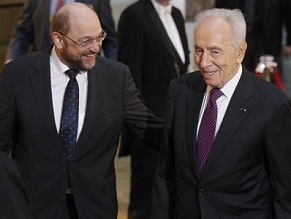|
World Jewish News

European Parliament President Martin Schulz (L) insisted the EU would continue to reject calls from MEPs to condition upgrading of EU-Israel relations to progress in the peace process, at a press conference following Israel's President Shimon Peres&#
|
EU’s Schulz on Peres visit: ‘no link between EU-Israel economic and scientific relations and peace process’
13.03.2013, Israel and the World European Parliament President Martin Schulz insisted the EU would continue to reject calls from MEPs to condition upgrading of EU-Israel relations to progress in the peace process, at a press conference following Israeli President Shimon Peres’ historic address to the 754 members of the EU assembly on Tuesday.
Stressing that the parliament and the EU as a whole have always sought “not to link directly (our) economic and scientific relationship to the peace process”, he addressed questions from the media regarding the EU’s position on the labelling of Israeli settlement produce as he conceded that whilst no conclusion had been reached on this issue, “the overwhelming majority of members across political affiliations are against the settlement policy of the outgoing Israeli government”, which ensures it will remain on the European agenda for the time being.
Picking up where his European Parliament counterpart left off, Peres said it was “time for me to speak up” on the contentious issue of Israeli settlement policy, which has dominated EU rhetoric in recent months, culminating last December with the EU Foreign Affairs Council conclusions, which saw Europe’s Foreign Ministers reiterate “their commitment to ensure continued, full and effective implementation of existing European Union legislation and bilateral arrangements applicable to settlement products”.
Contending that Israel had committed in principle to a two state solution, on which issue almost all political parties had reached agreement, he brought up the precedents of Israel’s former equivalent settlement policy in Sinai and Jordan, as he stressed that Israel had pulled out on reaching peace agreements with each country.
With this in mind, he said that Israelis were questioning why Gaza continue to shoot at them, “We want to be sure that the West Bank will not too become a basis of terror. It’s a legitimate question,” he concluded.
West Bank settlements constitute a mere 2% of the overall territory, he continued, as he invoked former US President Bill Clinton’s proposal for addressing the settlement issue, whereby Israel would compensate land in return for three settlement blocks in the West Bank, which he said had been unofficially agreed to by both Israel and Palestinian parties. Such details, he stressed, should be dealt with once peace had been reached.
“There are things illegal and legal” about settlements in Israel, he reiterated, highlighting that the internationally-condemned settlements in the West Bank and East Jerusalem had been approved by the Israeli parliament. “There are illegal acts of settlements, a few people trying to attack Palestinians – it’s illegal by us, we don’t need any sanctions,” he conceded as he insisted that the Israeli government continues to make arrests for such incursions.
Rejecting the legitimacy of calls for a boycott of Israeli settlement produce, he invoked the number of Arabs working in the settlements, as he concluded: “We need a positive solution and he time is available now to open negotiations with Palestinians.”
“The beginning is there, the solution is agreed, we have to handle the interim period and we will. You want to negotiate, please, but don’t intervene in a one-sided manner. Why are they shooting, after we took your advice and pulled out of settlements. I have much respect for you, I have much respect for the truth, but please look at the picture, look at the truth, and you’ll see we don’t lie” he added.
Invoking the mutual interests at the heart of the bilateral EU-Israel partnership, he called on the European Parliament to play its role in future peace talks with the Palestinians, as he said: “I can accept your criticism as no one can question our desire for peace and willingness to build a two state solution.”
Opening the press conference, Schulz highlighted the rare interest Peres’ visit to the parliament generated, as the first Israeli President to address its members its 28 years, which saw him conclude his speech to a standing ovation from across the political spectrum.
The President of the European Parliament conceded that “relations between the EU and Israel are good but have its problems as well” before adding that he had seldom seen the plenary dedicate so much attention to a speech of this kind, as he called it a “proud moment” personally to meet with the noted Israeli statesman, who, like the EU last year, is a recipient of the Nobel Peace Prize.
Earlier, some evidence of the often fractured relationship between Israel and the European institutions was on show during Peres’ address, as indistinct rumblings from the chamber accompanied Peres’ discourse on the threat posed by Hezbollah to global security, leading the president to call on members to “listen”.
There was also audible commentary between the parliament’s constituent groups as Peres concluded his speech by talking of his wish for even greater cooperation between the EU and Israel.
by: Shari Ryness
EJP
|
|
